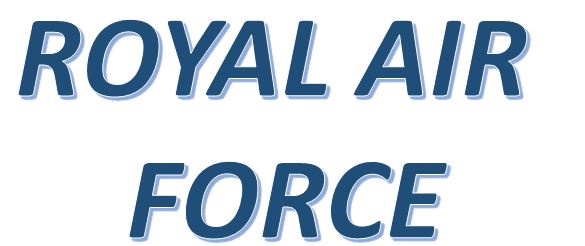The Royal Air Force (RAF) work to represent the interests of the UK in the air.
They are an established service who police both foreign and home skies, provide humanitarian services to overseas victims and act as an emergency unit for stranded people in mountainous or coastal vicinities.
In this blog, we’ll explore the wide range of RAF careers that are available.
Trade or Non-Commissioned RAF Careers?
As an employee of the RAF, you have the choice to work either as non-commissioned, or as a trade. Below we have outlined the differences between the two:
- Trades. Trades work alongside aircrew, providing them with technical support on the ground. Roles such an engineering, air traffic control and even dentistry are very common options for RAF servicemen to take.
- Non-Commissioned. Non-commissioned ranks are split into three groups: Airmen, non-commission officers and warrant officers. Generally, if taking the non-commissioned route, you will start as non-commissioned aircrew, working alongside pilots and crew members as a weapons system operator. The better you perform in the role, the more chances you will have to progress within the field. For example, you might rise to become an officer, or even to pilot.
Now, let’s take a look at some of the specialist RAF careers that are available:
RAF Specialist Careers
Aircrew: Aircrew are a fundamental part of RAF operations. They act as operational eyes and ears for the RAF, and play a vital role in search and rescue missions. This includes aircrew who specialise in areas such as system operation or linguistics, plane pilots and aircrew officers who are in charge of leading and organising RAF operations. Aircrew need to make sure they are available for duty at all times. While the majority of weekends will be left free, it will sometimes be required that aircrew work on these days. At times, aircrew can be away from their families and from home for periods of up to several months. This is because they are often posted abroad, on overseas missions.
Technical: Technical specialists play an extremely important role in RAF operations. They include engineers and technicians, who work on equipment that is essential to the running of the air service. Over 1/3 of RAF personnel currently work in the technical area of the RAF, and this number is only increasing. Other technical roles include: mechanical technicians, equipment engineers, weapons specialists and survival equipment specialists.
Hospitality: This is a lesser known area of the RAF. Hospitality refers to employees who are responsible for tasks such as catering, stewarding and cooking. In order to maintain the wellbeing of its servicemen and women, it is essential that the RAF provides them with good care. The hospitality sector of the RAF is the best way for them to do this.
Protection: This is a specialist sector that is responsible for the protection of RAF airbases, aircraft and servicemen/women. This includes weapons specialists, such as the Regiment gunners, and specially trained police and firefighters.
Medical: The medical sector is a vital part of RAF operations. It includes staff such as dentists and dental technicians, nurses, doctors, pharmaceutical specialists, surgeons, radiographers, medical assistants and environmental health experts. All of these staff represent the RAF in NHS hospitals, or work at RAF bases either in the UK or overseas.
Personal support: This is another lesser known sector of the RAF. The personal support sector includes administrative assistants, training exercise instructors and even musicians. In order to maintain the overall happiness of its staff, it is essential that the RAF provides them with access to services which they can utilise in their free time.
Operational support: Operational support personnel work to provide support to RAF aircraft and aircrew. They include staff such as: air traffic controllers, aerospace system operators, flight operational specialists and air cartographers. Without operational support staff, there would be nobody on the ground to brief pilots and provide in flight data and instructions.
Intelligence: This sector is responsible for monitoring the intelligence and communications of the RAF. The intelligence sector works diligently to maintain RAF telecommunications across the world, and also works to intercept and interpret messages from enemies and threats to global security. Roles within intelligence include: communication specialists, data analysts, intelligence officers and photographers.
Logistics: Workers in the logistics sector of the RAF are responsible to controlling stock, transporting essential equipment and organising transport. They are also in charge of looking after RAF budgets.
Human resources: The Human resource department of the RAF provide personnel and administrative support to the organisation. They are stationed in RAF headquarters, and alongside units posted in RAF territory. Human resource workers are responsible for supporting and preparing RAF staff in military operations and exercises, and have a role in recruitment, discipline and instructing.
